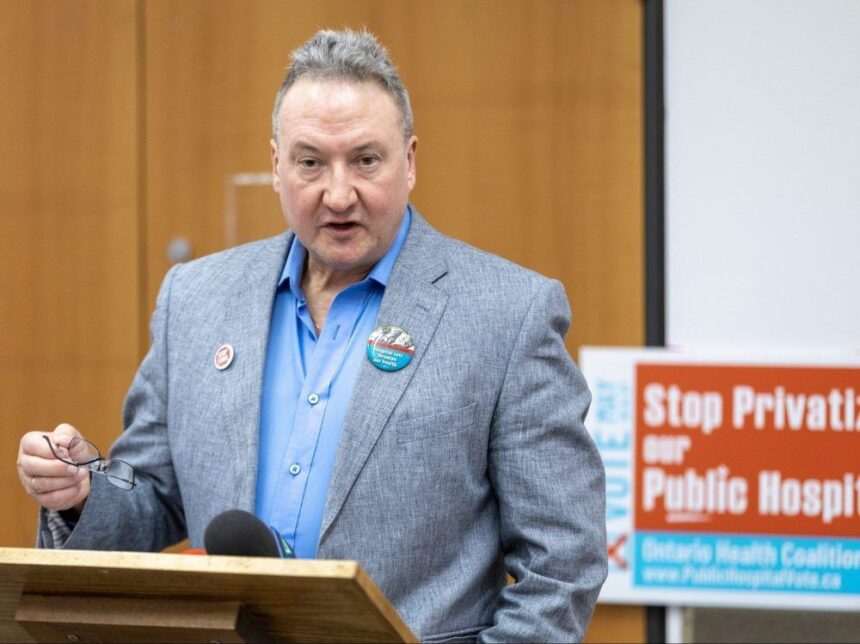Article – I’d been wondering why a regional health scandal in London, Ontario wasn’t getting provincial attention. The silence from elected officials seemed deafening.
So on Tuesday afternoon, I found myself sitting across from Peter Bergmanis in a small café just blocks from London Health Sciences Centre. The steam from his untouched coffee curled between us as he leaned forward, his voice dropping.
“There will be hell to pay,” said Bergmanis, co-chair of the London Health Coalition. “Our MPPs are hiding from their constituents while a hospital sues its own doctors.”
The controversy that has healthcare advocates fuming centers on London Health Sciences Centre (LHSC) launching lawsuits against several of its own physicians. The hospital is attempting to recover what it claims are overpayments made to doctors through their professional corporations over several years.
What makes the situation particularly troubling is the wall of silence from local elected officials. Despite repeated requests for comment from London-area MPPs – including Progressive Conservatives Rob Flack and Jeff Yurek – none have addressed the unusual legal action that has sent shockwaves through Ontario’s medical community.
Dr. Javeed Sukhera, a former LHSC psychiatrist who now practices in the United States, expressed concern about the precedent these lawsuits might set. “When hospitals turn against their physicians with legal action instead of dialogue, it creates a chilling effect on the entire healthcare system,” he told me during a video call. “Doctors become afraid to advocate for patients or challenge administrative decisions.”
According to documents obtained through freedom of information requests, the hospital alleges that certain physicians received payments beyond what their contracts permitted. The Ontario Medical Association has characterized the situation as “unprecedented” in a healthcare system already struggling with physician retention issues.
“I’ve spoken with nurses who say morale has completely collapsed,” Bergmanis said, gesturing toward the hospital visible through the café window. “You can’t run a healing institution in an atmosphere of fear and distrust.”
What makes this conflict particularly troubling is its emergence during Ontario’s broader healthcare crisis. Emergency room wait times at LHSC have increased 32% over the past year according to Health Quality Ontario data, while surgical backlogs continue to grow across the province.
Dr. Kathleen Leslie, a health policy researcher at Western University, believes the lawsuits reflect deeper systemic issues. “We’re seeing the collision of business management approaches with medical ethics,” she explained. “When healthcare institutions operate primarily as corporations, they sometimes make decisions that prioritize financial metrics over care relationships.”
For patients in the London region, the conflict adds another layer of uncertainty to an already strained system. Marilyn Dickson, a retired teacher who relies on LHSC for her cardiac care, told me she worries about physician exodus. “My cardiologist already has more patients than she can handle. If doctors start leaving because they feel targeted, where does that leave people like me?”
The Ontario Ministry of Health has maintained that the dispute is a “contractual matter” between the hospital and individual physicians. However, critics argue that when a publicly funded institution takes such unusual legal action, government oversight becomes necessary.
“Our healthcare system doesn’t exist in a vacuum,” said Bergmanis, who has spent decades advocating for public healthcare. “These hospitals operate with taxpayer dollars and provincial oversight. When MPPs go silent on something this significant, they’re abdicating their responsibility.”
What particularly frustrates local health advocates is the contrast between political engagement on other issues and the complete silence on this matter. London West MPP Peggy Sattler, who serves with the opposition NDP, has been the only provincial representative to publicly comment, calling for greater transparency from hospital administration.
As our conversation concluded, Bergmanis gathered his papers – emails, meeting minutes, and unanswered letters to elected officials – and tucked them back into a worn folder.
“Healthcare isn’t just another political file,” he said, finally taking a sip of his now-cold coffee. “When a hospital starts suing its doctors instead of working with them, and our elected officials say nothing, it tells you everything about how we’ve lost our way in protecting public healthcare.”
As I left the café, I couldn’t help noticing patients and families streaming in and out of the hospital entrance across the street – most unaware of the unprecedented legal battle happening behind those walls, or the political silence that surrounds it.






